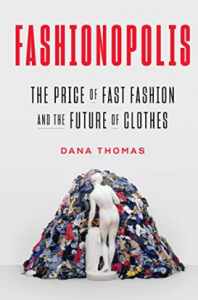
Make fashion clothes with less curelty and harm


A simple white tag that would go on any garment letting consumers know that it had been under humane conditions an idea by a Chicago-based activist, Florence Kelley proposed in 1899, pushing cruelty out of the clothing supply chain. It is a pity her idea didn’t catch on, as it could have saved the world a lot of misery over the intervening 120 years.
For people interested in clothes or working in the industry, Dana Thomas’s book will have two uses, a history of the human and environmental damage done by the mass production of clothes, and it tells the stories of entrepreneurs and scientists who are trying to make clothes with less cruelty and filth.
The story is globalisation, and how it delivers cheap, high-quality goods by externalising the costs of production while concealing this manoeuvre from the end consumer. A timely narrative, with increasing pressure on consumers to buy less clothing especially one-season disposable pieces from fast-fashion outlets. In the UK, an Oxfam campaign is asking consumers to abstain from buying new clothes for all of September just in time for London Fashion Week.
It is extreme labour intensity of cutting and stitching fabric and the chemicals needed to colour and soften it and the awful history here is familiar from the satanic mills of 19th-century Manchester to Triangle shirtwaist fire in New York, in the early 20th , to that disaster’s terrible reptitions in today’s Bangladesh’s Tazreen Fashion factory in 2012, which killed 117 workers.
Thomas’ description of the wasteful, dangerous and polluting process that is required to pre-wash and distress blue jeans, as each pair of jeans can generate several gallons of toxic waste water and workers often hand-sand jeans to create that weathered look.
Thomas joins Kelly in hoping that a better-informed consumer might make better choice, and better technology can eliminate the worst jobs and limit the environmental impact. Everything form modern, hyper-automated spinning mills to robot stitchers to leather and silk grown in test-tubes or vats.
Econyl, a recycled form of nylon, made by the Italian manufacturer Aquafil, turns old fishing nets, carpets into new speedo swimsuits, Breitling watch straps, and Stella McCartney outerwear.
Thomas’ emphasis on upstart innovators and entrepreneurs is part of what makes the book interesting to read. The likes of H&M, Zara and Uniqlo should take note and reform their supply chains.
Thomas urges us not to buy disposable clothes and to chose high-quality goods that can be repaired.
Fashionopolis: The Price of Fast Fashion – & the Future of Clothes by Dana Thomas, Head of Zeus £20/ Penguin Press $28, 320 pages.
